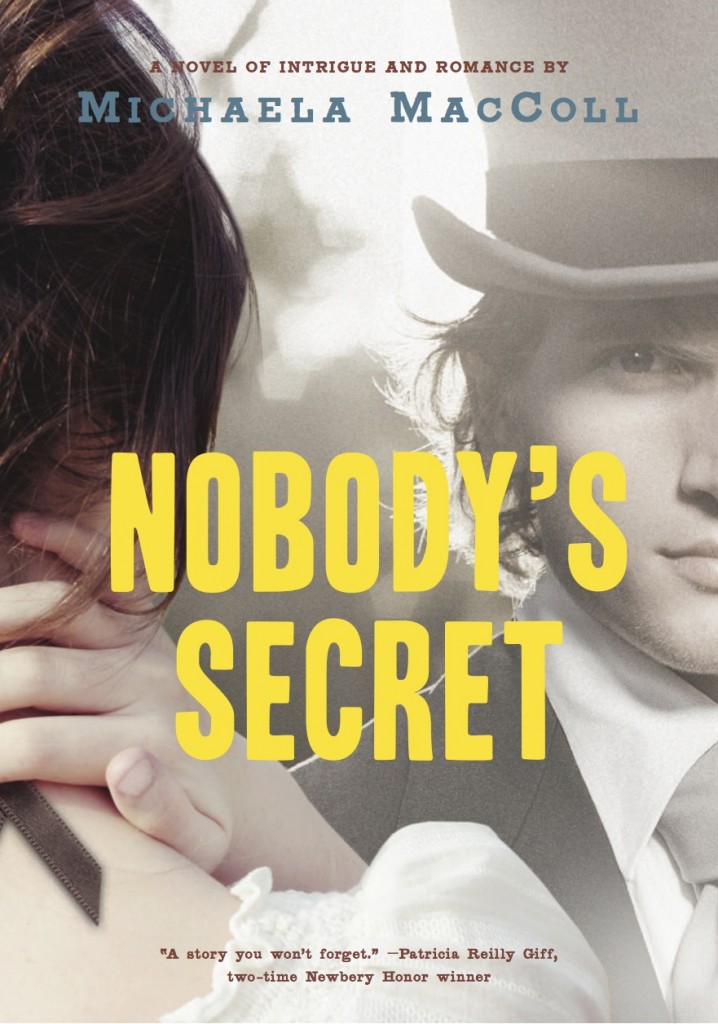Book Jacket:
One day, fifteen-year-old Emily Dickinson meets a mysterious, handsome young man. Surprisingly, he doesn’t seem to know who she or her family is. And even more surprisingly, he playfully refuses to divulge his name. Emily enjoys her secret flirtation with Mr. “Nobody” until he turns up dead in her family’s pond. She’s stricken with guilt. Only Emily can discover who this enigmatic stranger was before he’s condemned to be buried in an anonymous grave. Her investigation takes her deep into town secrets, blossoming romance, and deadly danger. Exquisitely written and meticulously researched, this novel celebrates Emily Dickinson’s intellect and spunk in a page-turner of a book that will excite fans of mystery, romance, and poetry alike.
You can read an excerpt here.
Review:
There is something so frustrating about a book that is fine, but never quite manages to rise to the level of good. That, for me, was this book – the historic detail is lovely, and the clues do all come together in the end, but all in all this story just fell flat, for me. Something vital was missing.
But what this book does do, and does well, is make for a lovely introduction to Emily Dickinson. I am by no means a poetry buff – close to the opposite, in fact – but even I very much enjoyed how MacColl made such a legendary literary icon into an obstinate, intelligent, quietly rebellious teenage girl. But while I respected Emily, for daring to poke her nose into places it doesn’t belong in search of the truth, I also just couldn’t quite get beneath the surface of her character. And so I had only a vague sense of Emily, of her personality and character, and nothing more – and so I liked her only in a vague kind of way. And while it all made for a fun exercise in demystifying the literary mystique of Emily Dickinson – and I enjoyed how the story riffed off Emily’s poetry, playing on and around ideas of what might have inspired her – all in all it just wasn’t enough to make for a fully satisfying read. But even as a somewhat dry story, it did still make Emily’s poetry feel alive in an engaging way.
But of course, you can always count on MacColl for her sense of time and place. As a portrait of history, this story is lovingly detailed and so beautifully illustrates the narrow lives of women at the time – the endless rounds of housekeeping, the dance of tea parties, social hierarchy and of course, marriage – and I appreciated how MacColl had Emily chaff at the bit, as it were, with the frustration of having a first-rate mind and no reason to employ it. But while I enjoyed the authentic ring to this story – and how it made me appreciate my modern freedoms all the more – it also frustrated me, in how it made the story as limited as Emily herself; and that sense of confinement, while wonderfully portrayed, was also stifling. And so, while there is intrinsic value in having a story bound by historical convention, it also sabotages this story, in a way, in that there is no pervasive sense of danger, no tension, no real drive or sense of urgency to move the story along.
And yet, the mystery is able enough – the logic works perfectly well, and the pieces all fit together – and while it was a rather straightforward whodunit (and I did get ahead of it), I still enjoyed watching Emily exercise her brains, both helped and hindered by her courage and naivete. And while I respected Emily, for being willing to suffer some tarnish on her reputation to do what she believes is right, again, sadly, I just wasn’t that invested in her. I just wasn’t moved to worry about her safety, and I wasn’t moved to cheer when she caught the bad guy – at most I achieved mild interest.
So in the end, this is a quiet little story about a quiet little town, wherein a teen girl chafes at the restrictions on her life but is never truly able to overcome them. It all makes for an interesting window into the life and times of Emily Dickinson, and I appreciated the story fully in that respect, but it also made for a somewhat dry read. The shades of the famous literary icon that is Emily Dickinson are lovely, and they are easily my favorite part of this book, but they’re not enough to overcome the rather flat nature of the story. And so there is merit to be found here, but sadly it does not make for a fully satisfying read.
Byrt Grade: B+/B
As Levar Burton used to say – you don’t have to take my word for it…
Publishers Weekly (starred review) says:
MacColl skillfully draws from Dickenson’s life to create a vision of the young poet as sharp-thinking, nature-obsessed, and determinedly curious. Lines from Dickinson’s poems open the chapters, which hint at how the themes and subjects they explored might have developed in her life and mind, providing tantalizing – if fictional – context for the poet’s taut verse.
Emily doesn’t quite come alive: The novel captures her daily life and her poetry but not her living heart. MacColl’s previous books are better.







i don’t know much about emily dickinson or poetry either but this premise sounds really interesting. sad that it never got to that “good” point. that happens to me a lot, too. a book will be enjoyable but totally forgettable. maybe you’ll have better luck with the next one.